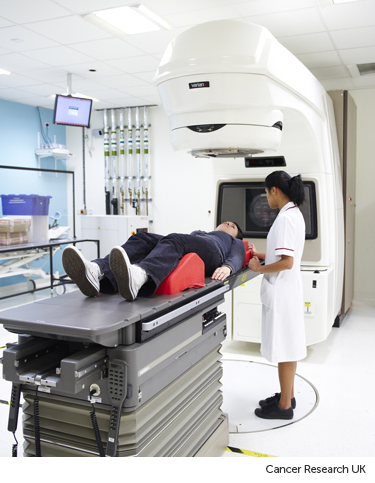Radiotherapy for fungating tumours
Fungating tumours are sometimes called fungating wounds or ulcerating cancers. Fungating tumours happen when cancers break through the skin surface. They are also known as ulcerating cancers, malignant wounds or cancer wounds. Radiotherapy can shrink the cancer and help dry up the wound.
Cancer wounds can also develop from skin cancers such as melanoma.
They can be upsetting to cope with and they might be painful, bleed or produce liquid. They can also smell unpleasant.
How can radiotherapy help?
You might have radiotherapy treatment for a fungating tumour. Radiotherapy can help to shrink the cancer, dry it up and heal the wound to control pain and bleeding. It won't cure your cancer but can keep it under control.
Your doctor might recommend that you have antibiotics as well as the radiotherapy. Antibiotics can control infection and reduce any unpleasant smell from the wound.
How you have treatment
Before you have treatment you have a specialised CT planning scan. The treatment team use this to plan exactly where to give the radiotherapy. You might also need to have a plastic mould made to keep you completely still during the treatment.
Your doctor tells you how many radiotherapy appointments you'll have. This can vary from person to person but might range from 5 to 10 treatments over the course of 2 weeks. Each treatment is called a fraction. You usually go to the radiotherapy department once a day from Monday to Friday.
The radiotherapy machine is called a linear accelerator. To have the treatment you lie on the radiotherapy couch. The therapeutic radiographers help you to get into the right position.

They then leave the room. This is so they are not exposed to radiation. You are alone for a few minutes while you have the treatment. But they can see and hear you the whole time.
You can't feel the radiotherapy. It doesn’t hurt but you might find it uncomfortable to lie in position during the treatment. The radiotherapy couch can be quite hard. You can ask your doctor if you can take a painkiller half an hour beforehand if you think it might help.
Treatment results
Radiotherapy works well for many fungating (ulcerating) or bleeding cancers. You should notice that your symptoms start to improve within 1 or 2 weeks. But a large or deep ulcer will take some time to heal. The treatment might heal the ulcer completely or it may shrink it and make it easier to manage.
Side effects
The ulcerated area may seem worse when you start radiotherapy. This is because the cancer cells are dying off and making the wound seem larger or deeper. But then it should start to improve and heal.
Other side effects are usually mild. You may feel tired. Or have a mild skin reaction to the radiotherapy, making the surrounding skin red, or dry and flaky.



